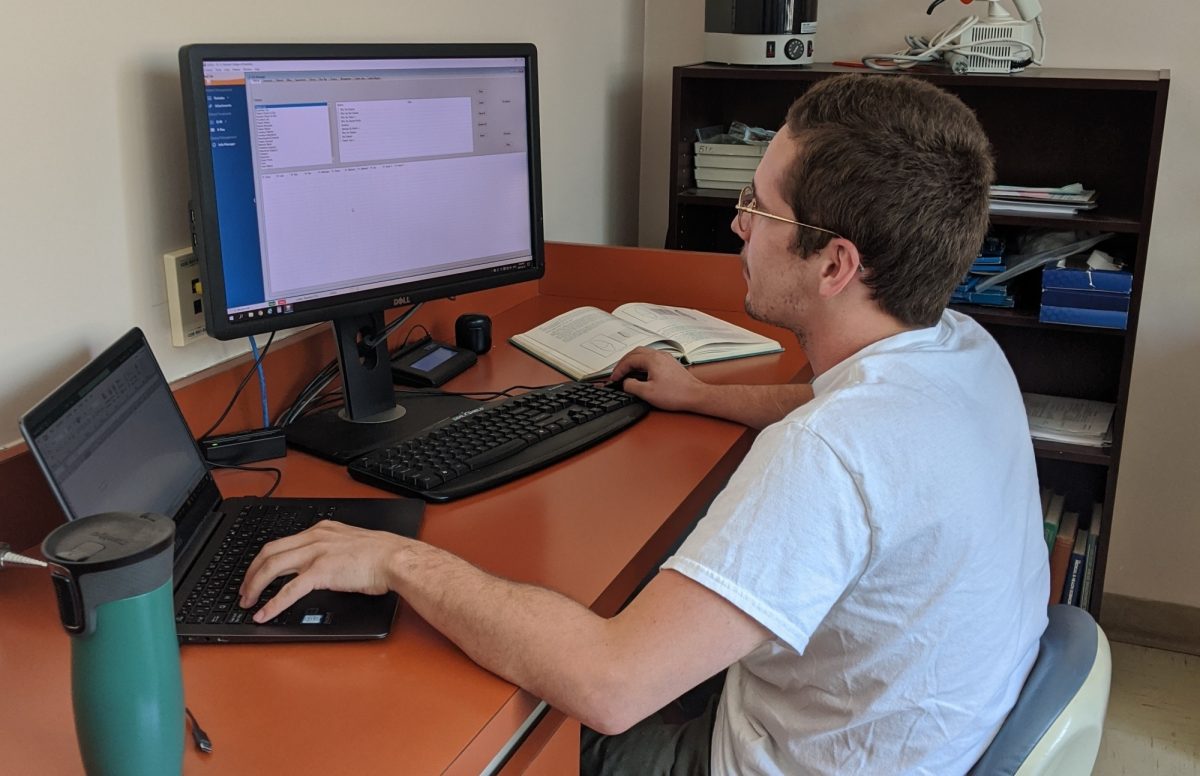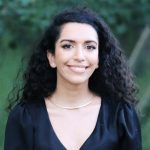
Stefan Mezibroski, who is entering his fourth year as a doctor of dental medicine student, works on his B.Sc. (Dent.) project from home.
Pandemic won’t stop B.Sc. (Dent.) research
Troubleshooting is a major part of research under normal circumstances. However, with the COVID-19 pandemic, it takes even more problem-solving to carry out a project.
Students enrolled in the Dr. Gerald Niznick College of Dentistry’s bachelor of science in dentistry (B.Sc. (Dent.) program have had to be creative and adapt to the current situation because of the COVID-19 outbreak.
The B.Sc. (Dent.) program provides dental students with the opportunity to spend two summers working full-time on a research project.

Aarushi Dhawan
Aarushi Dhawan, who is entering her third year as a doctor of dental medicine student, is looking at what patients value most when making a decision to pursue orthodontic treatment and when selecting a provider. She also aims to understand the influence of social media compared to traditional marketing strategies so that clinicians offering orthodontic treatment are better equipped to expand their patient base in the age of Covid-19.
While Dhawan planned to collect information from patients in person and through questionnaires in clinics, she has had to transition everything online because of the pandemic.
“It’s been difficult,” the second-year B.Sc. (Dent.) student said. “To encourage patient participation online is a bit more challenging.”
Dr. Fabio Pinheiro, assistant professor in the division of orthodontics, department of preventative dental science, Dr. Gerald Niznick College of Dentistry, said Dhawan is doing an excellent job and is learning from the challenging experience.
“I think she has developed her critical thinking through brainstorming and is anticipating what the problems are and how we can overcome them during the data collection process,” said Pinheiro, who is Dhawan’s supervising professor on the project. “I think she has also started becoming more independent when it comes to implementing all the methodology.”

Stefan Mezibroski
Stefan Mezibroski, who is entering his fourth year as a doctor of dental medicine student, faced a couple of challenges because of the pandemic but has adapted to the setbacks. Mezibroski is conducting a retrospective study to assess the effectiveness of several restorations to see which is the best to use.
Because the Bannatyne campus is closed due to the pandemic, Mezibroski couldn’t access patient records.
“Fortunately, the challenges that have arisen have just caused a minor delay,” said Mezibroski, who is in his second-year of the B.Sc. (Dent.) program. “While I was restricted from accessing the records, that time allowed me to focus on other areas of the project that don’t require school resources.”
The B.Sc. (Dent.) program, which 12 students are enrolled in this summer, allows students to get a taste of research to see if it is something they would like to do after becoming a dentist. Students have the option of enrolling in the program at the end of their first or second year of dental school. They receive a $5,000 stipend each summer of the B.Sc. (Dent.) program.
“It prepares them for the future to get into research if they’re interested and it helps them assess new products as they come into their practice,” said Dr. Raj Bhullar, associate dean (research), Dr. Gerald Niznick College of Dentistry. “It’s a big help to them.”
Dhawan said that she has an interest in pursuing research after dental school because of her experience in the B.Sc. (Dent.) program.
“I think as a dentist, providing treatment is just one aspect of a multifaceted career,” she said. “Contributing to the advancements and progressions of this field is important. It’s another role.”
Not only does the B.Sc. (Dent.) experience open students’ eyes to research, Pinheiro said it also prepares them for their career in the dental clinic.
“When they are in a dental practice and they face a problem, based on what they learned during the research process, it helps them be better prepared to overcome the obstacles and try to find out the solutions in a more organized way,” he said, adding that they also develop their writing skills.
The students turn in a mini-thesis at the end of the program and give a presentation outlining the project results. The college provides funding for students to attend national meetings to give their presentations.
“We have attracted a very high calibre of students to our B.Sc. (Dent.) program who have gone on to receive awards at national and international competitions for their research,” Bhullar said.
Bhullar added that the program also gives students an advantage when applying to specialty programs, which includes a research component.
“Students have been successful in applying to various specialty programs in Canada as well as internationally,” he said. “The B.Sc. (Dent.) program gives them a leg up.”






